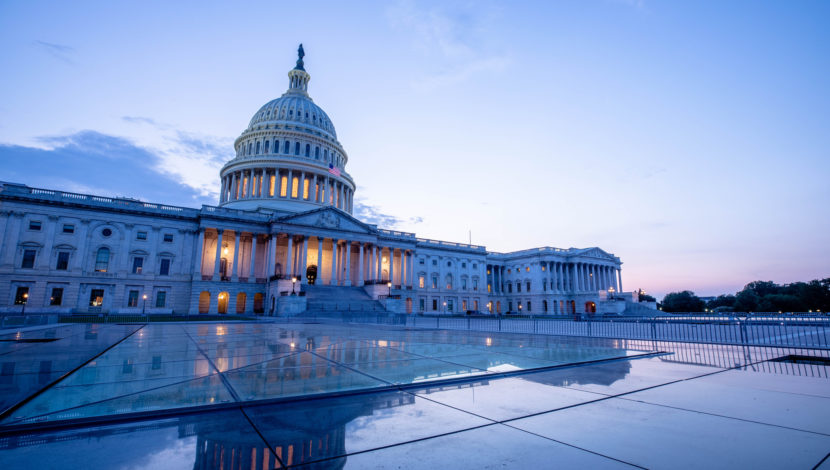The Unitarian Universalist Service Committee advances human rights through grassroots collaborations.
5 Reasons to Care About the Budget Reconciliation

By UUSC Staff on August 4, 2022
After months of a legislative stalemate and will-they-or-won’t-they drama, Congress finally looks ready to vote on a major budget reconciliation deal. The wonky-sounding name for this type of legislation doesn’t do justice to its massive importance. Included in the draft package are potentially transformative changes to the nation’s climate and energy policy. Equally important, upcoming attempts to amend the bill could harm thousands of people seeking asylum at our borders. Here are the specifics of what we’re tracking in this bill—and why it matters:
- If passed, this legislation could be the largest climate bill in this country’s history.
The climate provisions in the draft legislation are not minor or merely technical changes. If passed as written, they could potentially overhaul the nation’s enemy system, vastly reducing U.S. reliance on fossil fuels and enabling the country to pivot toward clean energy. Supporters estimate the bill could lead to as much as 40% reductions in U.S. greenhouse gas emissions by 2030. This would fall short of the Biden administration’s pledges to halve emissions by that date; but it is better than seemed possible to many observers just a few weeks ago, when major climate legislation appeared to have no path forward in this Congress.
- BUT, the bill is not all good news on climate.
Shamefully, in an effort to win party consensus on the legislation and reach the minimum of 50 votes needed to pass it in an evenly-divided Congress, the drafters of this package snuck in a lot of harmful concessions to the fossil fuel industry. Perhaps worst of all, the bill would tie further clean energy development to mandatory lease sales for oil and gas drilling in the Gulf Coast and Alaska. The Indigenous Environmental Network (IEN) describes these provisions as “an unprecedented quid pro quo with oil and gas leasing” that is “of particular concern for Alaska Native communities [and] BIPOC communities in the Gulf South” (which includes many of UUSC’s long-standing partners in our climate justice work). This is only one of multiple compelling reasons to oppose the legislation in its current form.
Some analysts predict that even with these destructive provisions, the bill would still result in a net emissions reduction. By one estimate, the reductions attributable to the bill would outweigh the increased emissions from new fossil fuel projects by a factor of 10 to one. Even if this is true, however, it is far from good enough. Frontline communities should never be treated as “sacrifice zones” whose futures are bargained away to secure concessions from right-wing politicians.
All the harmful provisions that IEN cites must go before we could get on board with this legislative package. We’ll be monitoring changes to the bill as a final vote approaches and advocating for improvements that would eliminate the give-aways to fossil fuel interests and other “poison pills” in the current draft text.
- This bill does not change the need for executive action and global action.
Given the harmful provisions that are currently in the draft text, it is far from an adequate response to the climate crisis. Regardless of what happens with its final passage, President Biden should still act on his own authority to declare a climate emergency and take bolder action to halt fossil fuel extraction on public lands. Moreover, action from the United States must be paired with efforts on the global stage to address the climate crisis. As we have said before, climate change is a global problem requiring global solutions. That is why we are joining our partner’s call for an advisory opinion from the International Court of Justice on states’ human rights obligations to address climate change.
- Also, there will be attempts to sink the legislation by making it worse.
Even as we hope the bill could be improved from its current form, there are active efforts in Congress to make it even worse. Half of sitting senators are expected to oppose the current legislation on partisan grounds. When the bill finally comes to the floor, following the senate parliamentarian’s review, and enters an amendment free-for-all known as “vote-a-rama,” these senators are expected to try to attach numerous controversial amendments to the bill in an effort to doom its passage. Fifty votes in the Senate would be enough to defeat all of these amendments and restore the bill to its original form through a final “wrap-around” amendment, but it is not clear that all 50 Senate Democrats plan to vote in lock-step on these measures.
Of particular concern, some right-wing members of Congress are expected to introduce amendments that would indefinitely extend the Title 42 policy, in addition to other harmful anti-immigrant measures. Despite the fact that such legislation would doom the U.S. asylum system, trap thousands more people in danger, and violate international refugee law, it is not clear that there are 50 guaranteed votes to oppose it. In the past, conservative members of both major parties have signaled their openness to enacting such harmful measures.
- We must take action to defeat these poison pill amendments before it’s too late.
A legislative extension of Title 42 would be a disaster. Already, in its nearly two-and-a-half years of existence, this policy has expelled people to dangerous conditions millions of times. Congress must not double down on this disgraceful violation of our moral and legal obligations to people seeking refuge. Fortunately, there is still a chance to contact your members of Congress to oppose such measures. You can take action through UUSC to call your senators and representative. Help us urge all members of Congress to hold the line against any legislation that would extend Title 42, including in the form of amendments proposed during the Senate’s “vote-a-rama” process.
Judging by its name, “budget reconciliation” may sound like a snooze-fest. However, it implicates the future of many of the values we hold most dear. It may even make the difference to our collective survival. It is crucial that we make our voices heard to ensure that the best possible version of this bill becomes law, and that it does not double down even further on the exclusion and oppression of climate-affected frontline communities and asylum-seekers arriving at our borders.
Photo Credit: iStock— Steven Emlund

